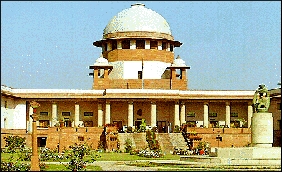|
|
|

|
SC agrees to form constitution bench to hear pleas against polygamy, 'nikah-halala'
|
|

|
|
| Top Stories |
 |
|
|
|
IANS | 24 Nov, 2022
The
Supreme Court on Thursday agreed to reconstitute a constitution bench
to hear a clutch of petitions challenging the constitutional validity of
the practice of polygamy and 'nikah-halala' among Muslims.
On
August 30, a five-judge constitution bench comprising justices Indira
Banerjee, Hemant Gupta, Surya Kant, M.M. Sundresh, and Sudhanshu Dhulia
had issued notice on the petitions. However, two judges -- justice
Banerjee and justice Gupta -- have retired now.
On Thursday, one
of the petitioners, advocate Ashwini Upadhyay, mentioned the matter
before a bench headed by Chief Justice D.Y. Chandrachud and comprising
justices Hima Kohli and J.B. Pardiwala, which said it will form a new
bench.
A total of nine petitions have been filed challenging the
constitutional validity of the practice of polygamy and 'nikah-halala'.
Polygamy
allows a Muslim man to have four wives, and once a Muslim woman has
been divorced, her husband is not permitted to take her back even if he
had pronounced talaq under the influence of any intoxicant, unless his
wife undergoes nikah-halala, which involves her marriage with another
man, who subsequently divorces her so that her previous husband can
re-marry her.
The petitions have been filed by Muslim women and
advocate Ashwini Upadhyay challenging the constitutional validity of
polygamy and nikah halala. These cases were referred to the five-judge
bench by a three-judge bench in March 2018.
In August, the apex
court had issued notice to the Centre, National Commission for Women,
National Commission for Minorities, Law Commission etc., and scheduled
the matter for hearing after Dussehra holidays.
Upadhyay's plea
said the injury caused to women as a reult of the practice of triple
talaq, polygamy and nikah halala is violative of Articles 14, 15 and 21
of the Constitution and injurious to public order, morality and health.
The
plea sought a direction to declare Section 2 of the Muslim Personal Law
(Shariat) Application Act, 1937, unconstitutional and violative of
Articles 14, 15 and 21 of the Constitution, insofar as it seeks to
recognise polygamy and nikah-halala.
"It is well settled that
common law has primacy over personal law. Hence, this court may declare
that triple talaq is cruelty under Section 498A of the IPC, nikah-halala
is rape under Section 375 of the IPC, and polygamy is an offence under
Section 494 of the IPC," Upadhyay's plea read.
In August 2017, the top court had held that the practice of triple talaq is unconstitutional and struck it down by 3:2 majority.
In
its 2017 verdict, the apex court had kept open the issue of polygamy
and nikah-halala, while quashing the practice of triple talaq.
"It
is submitted that religious leaders and priests like imams, maulvis
etc., who propagate, support and authorise practices like talaq-e-bidat,
nikah-halala and polygamy are grossly misusing their position,
influence and power to subject Muslim women to such gross practices
which treat them as chattel, thereby violating their basic rights
enshrined under Articles 14, 15 and 21 of the Constitution," Upadhyay's
plea read.
|
|
|
| |
|
|
|
|
|
|
|
|
|
|
|
|
|
|
| |
| Customs Exchange Rates |
| Currency |
Import |
Export |
US Dollar
|
₹91.35
|
89.65 |
UK Pound
|
₹125.3
|
₹121.3 |
Euro
|
₹108.5
|
₹104.85 |
| Japanese
Yen |
₹58.65 |
₹56.8 |
| As on 19 Feb, 2026 |
|
|
| Daily Poll |
 |
 |
| What is your primary "Make or Break" expectation from the Finance Minister this year? |
|
|
|
|
|
| Commented Stories |
 |
|
|
|
|
|
| |
|